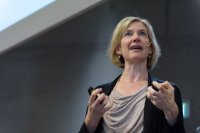Photo: Guy Ackermans
When seven hundred people – most of which students – come to listen to a technical story on molecular biology on a Friday afternoon, you know something special is going on. This is exactly what happened yesterday in the Waaierzaal, where American scientist Jennifer Doudna and WUR alumnus Edze Westra spoke. Last Thursday, they received the Heineken Prize and Heineken Young Scientists Award respectively. In the Orion building on the Wageningen campus, they spoke of the impact of their work on CRISPR-Cas.
Using this defence mechanism that was discovered in bacteria, it is possible to edit genetic material – or DNA – of plants, animals, but also humans far more precisely than ever before. This is a very useful tool for plant breeders, animal breeders and biomedical researchers. Using CRISPR-Cas, you could relatively easily create such things as a common mushroom that does not turn brown after being cut or a cow without horns. But researchers could technically also alter human embryos. Think of applications such as curing genetic diseases or diminishing the chances of cardiovascular diseases.
Boundaries
This obviously brings up ethical dilemmas. And although Doudna and Westra seemed to prefer talking about the technical side of the matter, they did not avoid ethical questions. During a discussion with Philip Macnaghten, Professor holding a Personal Chair in Technology and International Development, they both pled for a reserved approach and for strict boundaries with respect to application in humans.

Despite this, Doudna found it hard to say where the line to intervene will be drawn in the future. She expects the pressure for further applications will greatly increase once it will be safe to fight diseases using CRISPR-Cas. She also finds it hard to draw a hard line between medical science and enhancement of humans. To which of these categories does decreasing the hereditary chances of Alzheimer or cardiovascular diseases belong, she asks the audience. This is the kind of dilemmas we should soon start thinking about, says Doudna, because the development of CRISPR-Cas is moving at an unprecedented speed.
Cutting and pasting genes
Edze Westra receives Heineken Young Scientists Award
